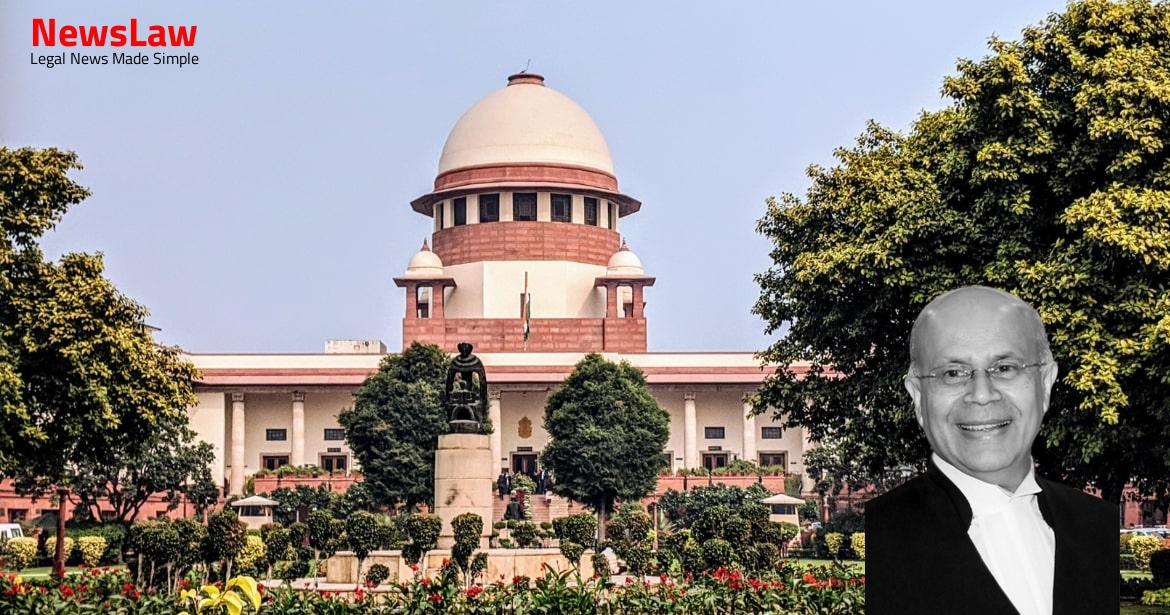Explore the detailed legal analysis of a case revolving around the classification of agricultural land. The court’s examination of relevant laws, precedents, and evidence sheds light on the complexities of determining the nature of the disputed land. Delve into the nuances of the legal arguments presented and the implications of the court’s ruling in this contentious matter.
Facts
- The Mutt wrote to the Assistant Commissioner (Endowments) for eviction of the lessee due to a graveyard on the land violating lease terms.
- A report stated that lease deeds without prior approval were null and void as per Acts and Rules.
- Subsequently, a new lease deed was made for 99 years on 137 acres 19 guntas.
- Challenges arose regarding the validity of lease deeds and encroachment notices were issued.
- The proceedings led to appeals and a legal battle, disputing the lease agreements.
Also Read: Landmark Judgment on Compensation for Fatal Accident
Issue
- Examining the effect of the order dated 25.8.2007 passed by the Joint Commissioner under the Inams Abolition Act.
- Determining whether the land in question is agricultural land to which the Telangana Charitable and Hindu Religious Institutions and Endowments Act, 1987 is applicable.
- Analyzing whether the lease in favor of the lessee stands cancelled in terms of Section 82(1) of the Act.
- Evaluating if the parties proceeded to trial with the understanding that the land in question was agricultural land in the proceedings before the Endowments Tribunal.
Also Read: Inter-State Jurisdiction: Assessing Legislative Competence
Arguments
- The parties went to trial fully aware of the real issues involved, so challenging the procedure after the trial is not valid.
- The Khasra Pahanis indicate the land as dry agricultural, cultivable, and uncultivable.
- The lessees were aware of the statutory cancellation of lease of agricultural land before the Tribunal.
- Judgment reference made to Bachhaj Nahar v. Nilima Mandal & Anr. regarding raising of new pleas in written arguments.
- The lease deeds required payment of land revenue at an enhanced rate for non-agricultural use.
- The purpose of the 1987 Act is to protect the interests of charitable and religious institutions.
- The land is described in different ways indicating agricultural nature and inam lands status.
- Reliance placed on Mahesh Dattatray Thirthkar v. State of Maharashtra.
- Argument made that Section 82 applies only if leased land is used for agricultural purpose.
- Case laws like Commissioner of Wealth Tax v. Officer in Charge (Court of Wards) and others cited regarding taxation laws on agricultural land.
- Lease deeds for 99 years could not be terminated in violation of notice period and non-existing grounds of termination.
- Reference to Urban Land (Ceiling and Regulation) Act, 1976 and the change of land to urban status.
- Rules framed under Andhra Pradesh (Telangana Area) Tenancy and Agricultural Lands Act, 1950 discussed.
- The nature of the land was a point of contention throughout the argument.
- Endowments Tribunal’s decision to cancel lease based on non-pleaded agricultural land status criticized.
- Application of rules like Section 28 of the Andhra Pradesh Land Revenue Act, 1317 Fasli discussed.
- Judgment references like Ram Sarup Gupta (Dead) by Lrs. v. Bishun Narain Inter College & Ors. mentioned.
- Issue of agricultural land status raised for the first time in written arguments submitted by the Mutt.
- Contradictions in the evidence regarding the nature of the land from different sources highlighted.
- Failure to convert land to non-agricultural use or seek permissions under various rules emphasized.
- Validity of Section 82 of the 1987 Act and its implications debated throughout the argument.
- The report and recommendations of the Commission headed by Justice C. Kondaiah discussed.
- The significance of the nature of the land over the purpose of its use by the lessee is emphasized.
- Rejection of the Municipal Corporation’s categorization of land as non-agricultural without proper evidence.
- The Mutt’s reliance on different notifications and orders to justify its position explained.
- Contention that the lessee did not outrightly assert non-agricultural land status properly addressed.
- The nature of the land and its historical classification as agricultural or non-agricultural explored.
- Lessee’s failure to provide evidence on the non-agricultural nature of the land noted.
- Importance of previous determinations and reports in establishing the status of the land highlighted.
- The land in question is classified as agricultural land, according to reports from the Inspector.
- The lease of agricultural land stands cancelled in accordance with Section 82(1) of the Telangana Charitable and Hindu Religious Institutions and Endowments Act, 1987.
- The validity of Section 82 has been upheld by the Court in previous cases.
- The lessee was informed about the cancellation of the lease under Section 82 of the Act in legal proceedings.
- The lessee had ample opportunity to address the issue of the leased lands being classified as ‘agricultural lands’.
- Arguments were made by both parties regarding the classification of the lands as agricultural, and the Joint Collector’s order was not considered an estoppel.
Also Read: Enhancement of Compensation and Interest Rate in Landmark Legal Ruling
Analysis
- The argument that the land falls within the urban agglomeration due to the Urban Land Act is not valid.
- Estoppel works in the same proceedings and in subsequent suits between the same parties on the same issue.
- The Tribunal’s procedures are not bound by the strict rules of the Civil Procedure Code.
- Findings in previous proceedings do not act as estoppel or res judicata for other proceedings.
- The Inams Abolition Act abolished all inams by the Nizam.
- Joint Collector assessed the nature of lands as inam lands and their agricultural use on a specific date.
- The land being within municipal limits does not negate its agricultural classification.
- The Revenue Divisional Officer considered granting occupancy rights to the Mutt’s attorney.
- Certain lease deeds lacked prior approval as required by the relevant rules.
- Judgments on inam lands prohibition were referenced to support the case.
- The Inams Abolition Act is not applicable to charitable and religious institutions.
- The High Court affirmed previous orders which had become final.
- Lessees were aware of the nature of the land as agricultural.
- Regulation 331 prohibits possession and transfer of tax-bearing lands across generations.
- The High Court cases and Tribunal rulings were focused on the agricultural nature of the land.
- Section 1(2)(i) of the Act applied till 26.12.1985
- Proviso to Section 4(1) exempted charitable and religious institutions from the Inams Abolition Act
- Section 82(4) of the 1987 Act deals with lease of immovable property other than agricultural land for charitable or religious institutions
- Rule 15 of the 2003 Rules states that leases subsisting on the commencement of the 1987 Act shall continue subject to prescribed rules
- In a judgment by a learned Single Judge of the Andhra Pradesh High Court, it was held that if the land is used for non-agricultural purposes, it is not covered by the Inams Abolition Act.
- Recent ruling in Nareshbhai Bhagubhai v. Union of India stated that if parties were aware of the land’s nature during trial and presented evidence without proving prejudice, they cannot later dispute the land’s nature in question.
- The lessee cannot dispute the nature of the land leased to them if it was known to both parties during trial. The Collector’s jurisdiction under Section 10 is dependent on the agricultural use of the land.
- In contrast, the Division Bench of the High Court in Siddhartha Academy held that land use for non-agricultural purposes is irrelevant for the statutory cancellation of a lease deed under Section 82(1) of the 1987 Act.
- An order by the Division Bench in certain SLP (Civil) cases was finalized on 27.2.2017, rendering it conclusive.
- The relevance of whether parties were aware during trial that the land in question was agricultural was discussed with reference to judgments in Bachhaj Nahar and Ram Sarup Gupta, emphasizing the importance of pleading and evidence in such cases.
- The direction to consider the request of the lessee to grant lease under Rule 15 is not tenable.
- The land in question has been determined to be agricultural land.
- The 2003 Rules are not applicable to the land in question.
Decision
- Civil Appeal Nos. 7759-7760 of 2014 are dismissed.
- Civil Appeal No. 7761 of 2014 is allowed, setting aside the direction to consider the request of the lessee under Rule 15 of the Telangana Charitable and Hindu Religious Institutions and Endowments Immovable Properties and other Rights (Other than Agricultural Land) Leases and Licenses Rules, 2003.
Case Title: GULF OIL CORPORATION LTD. Vs. STATE OF TELANGANA . (2022 INSC 953)
Case Number: C.A. No.-007759-007760 / 2014



